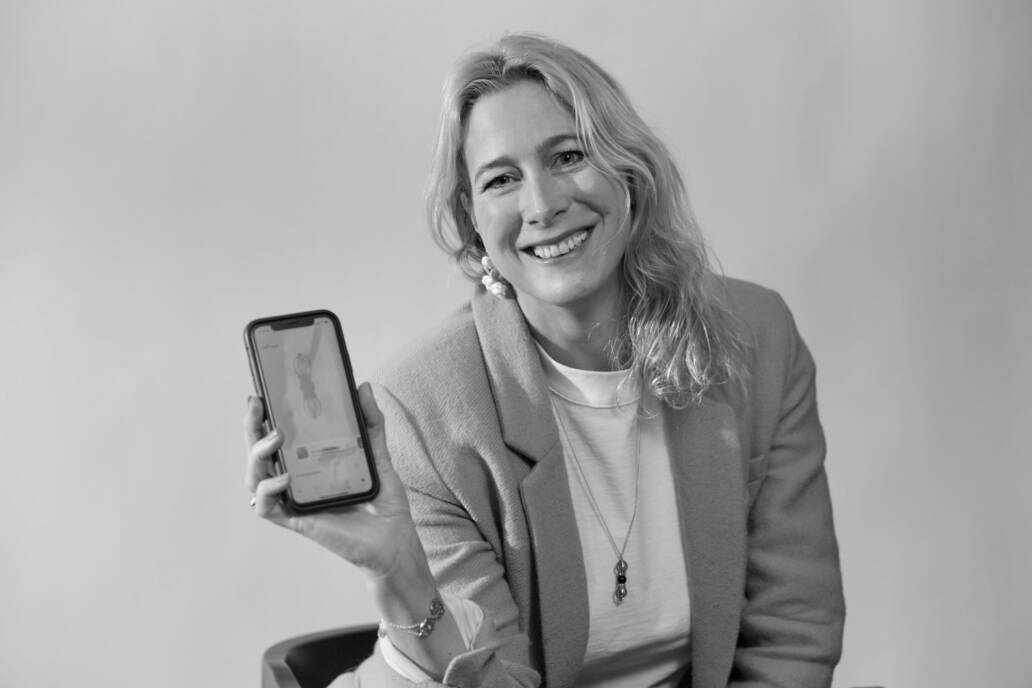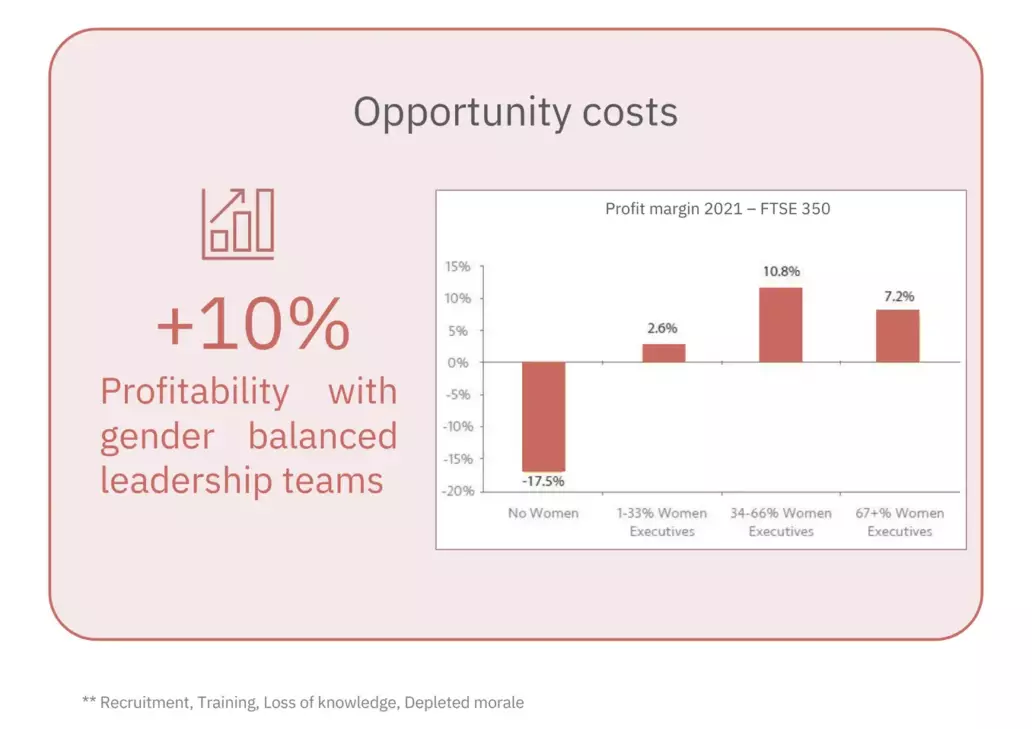
Veroniek Vermeulen, founder and CEO of Silatha.
Why solutions are needed
As we speak with more women and hear their stories, we realize that we don’t know much about what they go through in the workplace. Concerns such as pregnancy losses in the office are more common than we think. These stories were a big trigger to look at the whole world with different eyes and realize that it is perfectly designed for a male cycle. Women do everything to fit in. That’s where it goes wrong, and women burn out.
We can tick all the boxes: we have a fantastic job or earn lots of money, but women can suffer because they are wearing a mask. The moment you show yourself and take off that mask it triggers other people to do so too.
Women do everything to fit in. That’s where it goes wrong, and women burn out.
Mask off
We truly believe women are incredibly strong. They are carrying through so much pain and keep silent because they are taught from a very young age to “be a good girl and fit in”. Girls can often think they are in the wrong and this continues into adulthood. In areas such as science and engineering, women wear a mask for a very long time and learn to not show any vulnerability. There are also a lot of neurodivergent people, men and women, who try to fit into the default cycle. Humans are very good at assuming a different identity to fit in.
Women create a winning workplace
Diversity has a direct link with business profits. A more diverse workplace brings increased efficiency, productivity, and overall performance. These traits are not only brought out in women, but everyone involved, as whole dynamic of the business changes. Imagine every employee in your business is doing five times better than what they are doing now. Companies should understand that these factors have such a big impact on business results. Only then will they invest enough to make a real change.

When companies do try to acknowledge diversity, gender, or disability, much of the efforts are taken on by volunteers on top of their full-time job and busy lives. But women are not charity workers… although if you look at the fact that 75% of the unpaid labor in the world is done by women, they sometimes feel like one!
Imagine every employee in your business is doing five times better than what they are doing now.
Silatha is on an important mission: changing the workplace so that everyone can thrive. We want to create a psychologically safe work environment that unlocks human potential.
Psychological safety is not ‘girls only’
Men can be afraid to talk about female issues because they were never taught about them. This means men can feel very uncomfortable and unsafe around certain topics. Often diversity or gender-inclusivity meetings are packed with women, but we need men there. When men do engage and find out more, it is also very helpful for them. Some physical factors influence women’s emotional health so much that men say they don’t recognize their wives anymore. But, good news, often these health problems have a solution!
The effects are not only perpetuated by men, but there are also many women at the top who have had to be extremely strong to get there; they don’t have the benefit of the ‘old boys’ club’. Women sometimes get to the top and say, “I managed to get here, so you need to work harder if you want to get here.” But that’s not helping.
Examples of women’s health challenges
Women have a different body than men: the majority have a monthly period and can suffer from different conditions such as endometriosis, premenstrual dysphoric disorder (PMDD) or polycystic ovary syndrome (PCOS). Many women, and even some doctors, don’t know they are changing or that their symptoms have a clinically defined problem. Women’s pain is often ignored or pushed away.
Women’s pain is often ignored or pushed away.
One example is peri-menopause. If you search for menopause online you will find images of gray women, this is not a correct reflection if you know that the peri-menopause starts at the age of 45 on average. Women’s brains are actually changing before and during menopause. The first symptoms are often confused with stress, which makes sense in a stressful world. Then suddenly they get joint pains, brain fog, depression, anxiety attacks or a combination of any of the 34+ symptoms associated. For many of these symptoms, some solutions can be found through nutrition, exercise, lifestyle, or hormones. Then these women feel stronger again and perform better in the workplace.
Instead of looking at it in a negative way, like it is the end of their “fertile” lives, women should be informed that their brain literally transforms after menopause. They have more testosterone than before which makes us feel so much more secure and confident. Women are clearer about the direction where we want to go. There is a light at the end of the menopause.
Women should be informed that their brain literally transforms after menopause.
Maternal bias is one of the biggest biases there is, including something called the ‘motherhood penalty’. A woman who has a child has a much lower chance to get a job. And if she does get the job, she gets paid less. On the opposite side, there is the ‘fatherhood premium’ where a father is seen as needing to take care of his family, therefore he gets paid more and as in our minds he is ‘picture-perfect’. He is ultimately perceived as more competent.
To create meaningful change, we need to start with awareness. Then we need to help people to step into the shoes of the other person. Empathy is extremely important. That’s one of the reasons also why businesses are so much more successful when there’s more women, because women can create an empathetic environment for all genders.
Reaching out
Unfortunately, most of the time it is the employee who reaches out. They can be struggling but avoid talking to their manager due to fear of retaliation. It would be much better if senior management would come to us and say we want to create a psychologically safe work environment, even if was just for the profits! We want to motivate the C-suites to step up.
Health-focused companies often have a lot of women working in the organization. It is likely that half of the people working in that organization have themselves gone through the issues discussed above. There’s a faster understanding of the situation than there would be in a very tech organization where it’s very male-driven.
Read this article on the rise of women’s health-focused solutions
Sustainable safety
As anyone who worked in innovation knows, launching a new product requires a full-time project team with a budget, strategy, and goals for what they want to achieve. Having a celebration day for women is great as a starter, but it’s not changing anyone’s behavior. Unfortunately, this is what we still see in many companies.
8 billion has been spent worldwide on bias training because most people understand that we need to get rid of our biases. This training will affect employees in the short term, but then it is back to business if not integrated correctly. Companies need to invest first and then reap the fruits (better results and higher profits) later. For example, there seems to be a tendency that shows companies with no women on their boards are less likely to make profits, so it is better to have women on the board first and then enjoy the benefits of more diversity at the higher levels.
We believe that it is a matter of time and that we will evolve. Happy people make happy parents, which means they pass on their positivity to the next generation. So it’s not only good for business, it’s good for life.
Edited by Emma Buchet


